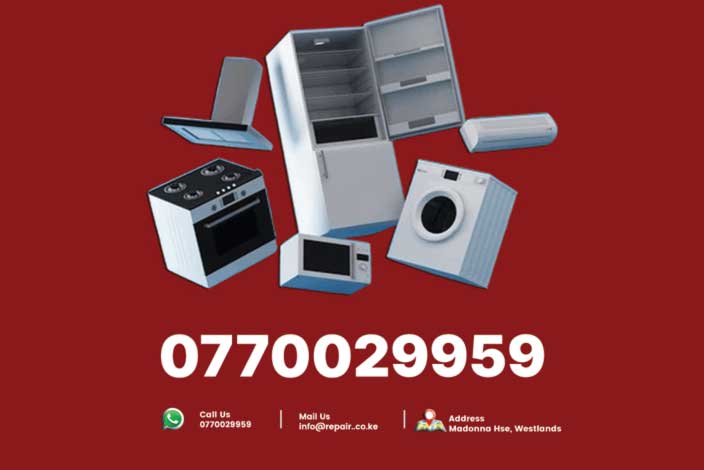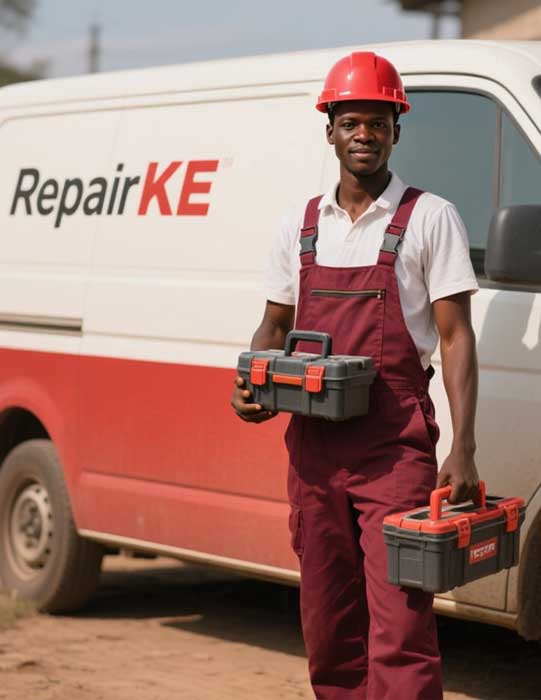Water Heater Repair Tips for Common Faults and Problems
By understanding common water heater faults and applying these repair tips, you can keep your system running efficiently and avoid unexpected cold showers. Regular maintenance, such as flushing the tank and checking the anode rod, can prevent many issues. For complex problems or when in doubt, trust Repair.co.ke to provide reliable repair services across Kenya.
Water heaters are essential for providing hot water for bathing, cleaning, and cooking in Kenyan homes. However, like any appliance, they can develop faults over time. Knowing how to identify and fix common water heater problems can save you time and money. This guide by Repair.co.ke outlines common water heater issues and practical repair tips to keep your system running smoothly.
1. No Hot Water
One of the most common complaints is a lack of hot water. This issue can stem from several causes depending on whether your water heater is electric, gas, or solar-powered.
- Electric Water Heaters: Check if the heater is receiving power. A tripped circuit breaker or blown fuse could be the culprit. Reset the breaker or replace the fuse if necessary. If the power supply is fine, the heating element or thermostat may be faulty. Test the heating element with a multimeter for continuity and replace it if defective. Thermostats can also fail, so ensure they are set to the desired temperature (typically 50–60°C for safety and efficiency).
- Gas Water Heaters: Ensure the gas supply is on and the pilot light is lit. If the pilot light won’t stay lit, clean or replace the thermocouple, which senses the pilot flame and allows gas flow.
- Solar Water Heaters: Lack of hot water may be due to insufficient sunlight or a malfunctioning backup electric element. Inspect the solar collector for dirt or shading and clean it if needed. Check the backup element as you would for an electric heater.
Pro Tip: Always turn off the power or gas supply before inspecting or repairing your water heater to avoid electric shock or gas leaks.
2. Inadequate Hot Water or Fluctuating Temperatures
If your water heater produces lukewarm water or the temperature fluctuates, the issue could be related to the thermostat, heating element, or sediment buildup.
- Thermostat Issues: For electric water heaters with two heating elements, one thermostat may be malfunctioning, causing only part of the tank to heat. Adjust both thermostats to the same temperature or replace a faulty one.
- Sediment Buildup: Over time, minerals in water can settle at the bottom of the tank, reducing efficiency. Flush the tank annually by draining it through the drain valve to remove sediment. Use a hose to direct water away from the house.
- Undersized Heater: If your household’s hot water demand has increased, your heater may be too small. Consider upgrading to a larger capacity unit if this is a recurring issue.
Pro Tip: Regular maintenance, like flushing the tank, can prevent sediment buildup and extend the life of your water heater.
3. Leaking Water Heater
A leaking water heater can cause water damage and should be addressed immediately.
- Loose Connections: Check the inlet and outlet pipes for loose fittings. Tighten them with a wrench, but avoid overtightening, which can damage threads.
- Pressure Relief Valve: The temperature and pressure relief (TPR) valve may leak if the tank pressure is too high. Test the valve by lifting its lever briefly to release water (use a bucket to catch it). If it continues to leak, replace the valve.
- Tank Corrosion: If the tank itself is leaking due to corrosion, replacement is often the only solution, as patching is rarely effective long-term.
Pro Tip: Place a drip pan under the heater to catch minor leaks and prevent damage to your floor.
4. Strange Noises
Popping, banging, or rumbling noises often indicate sediment buildup or overheating.
- Sediment Buildup: As water heats, trapped sediment can cause popping sounds. Flush the tank to remove debris.
- Overheating: If the thermostat is set too high, water may boil, causing noises. Lower the thermostat to 50–60°C. If noises persist, inspect the heating element for damage or scale buildup.
Pro Tip: Annual flushing can minimize noises and improve heating efficiency.
5. Discolored or Smelly Water
Rusty or foul-smelling water is a common issue, especially in older water heaters.
- Corrosion: Rusty water often indicates corrosion inside the tank or pipes. Check the anode rod, a sacrificial component that protects the tank from rust. If it’s heavily corroded, replace it. If the tank itself is rusted, consider replacing the heater.
- Bacteria Growth: A sulfur-like smell may result from bacteria in the tank, especially in areas with hard water. Flushing the tank with a hydrogen peroxide solution (diluted as per manufacturer guidelines) can kill bacteria. Raising the thermostat to 60°C temporarily can also help.
Pro Tip: Replace the anode rod every 2–3 years to prevent tank corrosion and extend the heater’s lifespan.
6. Slow Hot Water Recovery
If your water heater takes too long to reheat water, the issue could be a faulty heating element, thermostat, or insufficient insulation.
- Heating Element: Test and replace any faulty elements, as a single working element in a dual-element system will slow recovery.
- Insulation: In solar or electric heaters, poor insulation can lead to heat loss. Insulate exposed pipes and ensure the heater is in a sheltered location.
- Thermostat Settings: Ensure the thermostat is set correctly. A lower setting saves energy but may slow recovery.
Pro Tip: Insulating hot water pipes can reduce heat loss and improve recovery time.
Safety Precautions
- Always turn off the power or gas supply before performing repairs.
- Use proper tools and follow manufacturer guidelines.
- If you’re unsure or the problem persists, contact a professional technician to avoid injury or further damage.
When to Call a Professional
While many issues can be resolved with basic troubleshooting, some problems require expert attention:
- Gas leaks or persistent pilot light issues.
- Major leaks or tank corrosion.
- Electrical faults beyond simple resets or replacements.
- Solar water heater repairs involving the collector or circulation system.
At Repair.co.ke, we recommend regular maintenance to prevent costly repairs. If you’re in Kenya and need professional assistance, our team of certified technicians is ready to help with all your water heater needs.
For more home appliance tips or to schedule a repair, visit our website or contact our team today!






